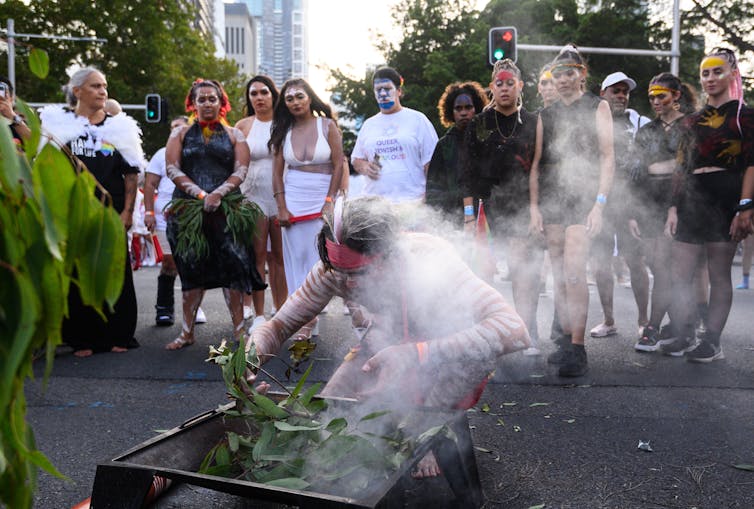New research shows how Indigenous LGBTIQ+ people don't feel fully accepted by either community
- Written by Braden Hill, Pro-Vice Chancellor, Edith Cowan University
A new Western Australian study, one of the first of its kind, reveals the complex experiences of those living at the intersection of being both Indigenous and part of the LGBTIQ+ community.
Two reports produced as part of this Healthway-funded Breaking the Silence project[1] are based on data insights from a survey of health care professionals and focus group sessions of health services and 63 Indigenous LGBTIQ+ community members.
This research was conducted by Indigenous LGBTIQ+ researchers and led by Edith Cowan University’s Kurongkurl Katitjin Centre for Indigenous Education and Research[2].
The findings provide valuable insights and recommendations for the health, education and community services sector in supporting Indigenous LGBTIQ+ people. There is a pressing need to respond effectively to the mental health concerns impacting Indigenous LGBTIQ+ communities nationally.
Pride despite discrimination
This research found many Indigenous LGBTIQ+ people feel a strong sense of pride in who they are and their unique position in being able to challenge misconceptions about being Indigenous in queer communities and queer in Indigenous communities. Being able to support younger people as they negotiate these intersections was also fulfilling.
While many queer Indigenous people value the ability to educate others about this complex identity position, this responsibility can also be burdensome.
Participants frequently experienced heterosexism and racism. They often felt invisible or marginalised within the LGBTIQ+ community, Indigenous communities and broader society:
more than 73% reported experiencing discrimination in the past 12 months
discrimination included being ignored or teased, maliciously ‘outed’, followed in public, or being victims of physical violence and other crimes
close to 13% experienced homelessness or housing insecurity because of their sexual orientation or gender identity
participants experienced both racism and queerphobia, but racism was more frequently observed as being most problematic.
For Aboriginal and Torres Strait Islander people, including those in the queer community, dating apps also present particular challenges[3]. Many participants indicated they purposefully do not mention they are Indigenous in seeking to form online connections within the LGBTIQ+ community due to a fear of racism.
 People gather around a person performing a Smoking Ceremony.
James Gourley/AAP[4]
People gather around a person performing a Smoking Ceremony.
James Gourley/AAP[4]
Intersection of identities clashing
More than half of the participants felt little or no sense of connection to the LGBTIQ+ community as Indigenous people.
Participants also reflected on having to endure micro-aggressions from non-Indigenous queer people. Stereotyping and forms of “casual” racism – being told they don’t look Aboriginal or made to feel like a “token” inclusion – were common examples.
A key issue for a third of participants was the sense of invisibility they felt within Indigenous communities due to their sexual and/or gender identity.
Some chose to hide their sexual orientation for fear of not being accepted by Elders and community leaders. Interestingly though, Elders who engaged in the research were very supportive of promoting acceptance.
A desire to form connections with other queer Indigenous people was of great importance. Many participants also described the constant negotiation of identities, surveying risks, or hiding parts of one’s self as being exhausting.
Read more: How young LGBTQIA+ people used social media to thrive during COVID lockdowns[5]
Inclusive health care and support is needed
A main focus of this research was Aboriginal and Torres Strait Islander/LGBTIQ+ peoples’ access to, and experiences with, a range of health, education, and social services.
Participants emphasised the importance of LGBTIQ+ friends, families, GPs, and counselling services in providing responsive care and support in times of need. Participants also highlighted significant levels of trust in Aboriginal community controlled health organisations.
This indicates more could be done by Indigenous health organisations to include Indigenous LGBTIQ+ people’s needs in their services.
All organisations that were surveyed expressed clear intentions to become better informed about the specific needs of Aboriginal LGBTIQ+ clients.
Community members and health care/support professionals also identified steps to improve care for queer Indigenous people. These included employing and retaining Indigenous LGBTIQ+ staff, using inclusive language, implementing specialist staff training, and initiating conversations on inclusion with boards and executives.
However, broader policy changes are also needed in health practices, including:
more extensive Indigenous LGBTIQ+ leadership on all Indigenous LGBTIQ+ matters
inclusive health and support services that welcome Indigenous LGBTIQ+ people proactively as both clients and staff
better national and state level data collection relating to Indigenous LGBTIQ+ communities and improved data collection within health and support services
ongoing professional development and training at all levels within an organisation
greater representation of Indigenous LGBTIQ+ people in public awareness/education campaigns and leadership positions
implementation of anti-racism strategies in organisations providing support or community connection to Indigenous LGBTIQ+ people
greater awareness of trans issues and safe referral pathways for Indigenous trans people.
Both racism and queerphobia must be addressed for Indigenous LGBTIQ+ people to feel a sense of connection and belonging within their communities. Courageous conversations about discrimination in all organisations and the wider Australian society are well overdue.
References
- ^ Healthway-funded Breaking the Silence project (www.ecu.edu.au)
- ^ Kurongkurl Katitjin Centre for Indigenous Education and Research (www.ecu.edu.au)
- ^ dating apps also present particular challenges (www.abc.net.au)
- ^ James Gourley/AAP (photos.aap.com.au)
- ^ How young LGBTQIA+ people used social media to thrive during COVID lockdowns (theconversation.com)

















